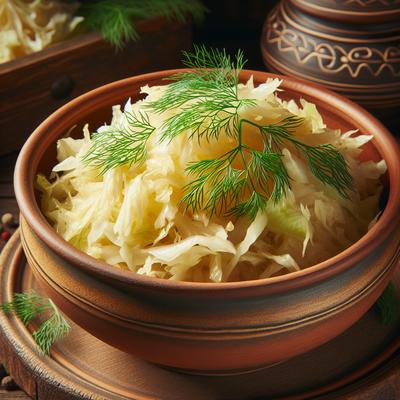Sauerkraut with Dill by Sy
Discover the bold and tangy flavors of homemade fermentation with 'Sauerkraut with Dill by Sy,' a vibrant twist on the classic recipe. This simple yet satisfying dish combines finely shredded green cabbage, grated carrots, and aromatic fresh dill to create a refreshing and herbaceous flair. Enhanced with the subtle warmth of optional caraway seeds, this recipe is perfect for those seeking a natural probiotic boost. With just kosher salt to draw out the cabbage’s juices and kickstart fermentation, this no-cook recipe requires only a few minutes of preparation before it transforms in your kitchen over time. Ideal for pairing with hearty sandwiches, grilled sausages, or as a crisp side dish, this dill-infused sauerkraut offers a deliciously healthy addition to any meal. Whether you’re a fermenting beginner or a seasoned pro, this recipe highlights the artistry of making small-batch fermented vegetables right in your own home.
Try SnapCalorie's FREE AI assisted nutrition tracking free in the App store or on Android.

Scan with your phone to download!

Ingredients
- 2 medium heads (about 4 pounds) Green cabbage
- 2 medium Carrots
- 2 tablespoons Kosher salt
- 1 bunch (about 1 cup chopped) Fresh dill
- 1 teaspoon Caraway seeds (optional)
Directions
Step 1
1. Remove the outer leaves of the cabbage and set aside for later use. Cut the cabbage into quarters, remove the core, and shred the cabbage finely using a knife, mandolin, or food processor.
Step 2
2. Peel and grate the carrots using a box grater or food processor. Add the grated carrots to the shredded cabbage in a large mixing bowl.
Step 3
3. Sprinkle the kosher salt over the cabbage and carrot mixture. Using clean hands, massage the salt into the vegetables for about 5-10 minutes. The cabbage will soften and release a significant amount of liquid.
Step 4
4. Chop the fresh dill finely and mix it into the massaged cabbage along with the caraway seeds if using. Combine well.
Step 5
5. Pack the cabbage mixture tightly into a clean, sterilized jar or fermentation crock. Use a wooden spoon, tamper, or your fists to press the mixture down as firmly as possible, ensuring it is submerged under its own brine.
Step 6
6. Take the reserved outer cabbage leaves and place one or two on top of the shredded cabbage to keep everything submerged. If using a jar, weigh the mixture down with a fermentation weight, small glass jar, or clean stone.
Step 7
7. Cover the jar or crock loosely with a clean cloth or place the lid on without fully sealing to allow gases to escape during fermentation.
Step 8
8. Leave the sauerkraut in a cool, dark place (ideally around 65-75°F) for 5-14 days. Check daily to ensure the cabbage remains submerged in brine, pressing it down if needed. Remove any surface scum as it forms.
Step 9
9. Begin tasting the sauerkraut after 5 days. When it reaches your preferred level of tanginess and flavor, transfer it to the refrigerator to slow fermentation. It will keep for up to 6 months.
Nutrition Facts
| Serving size | (3821g) |
|---|
| Amount per serving | % Daily Value* |
|---|---|
| Calories | 989.3 |
| Total Fat 4.7g | 0% |
| Saturated Fat 1.1g | 0% |
| Polyunsaturated Fat 0.1g | |
| Cholesterol 0mg | 0% |
| Sodium 4315.0mg | 0% |
| Total Carbohydrate 227.6g | 0% |
| Dietary Fiber 96.2g | 0% |
| Total Sugars 122.4g | |
| Protein 50.5g | 0% |
| Vitamin D 0IU | 0% |
| Calcium 1612.5mg | 0% |
| Iron 21.1mg | 0% |
| Potassium 6986.0mg | 0% |
Source of Calories
